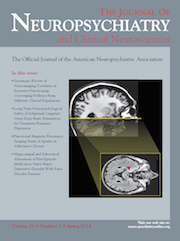Brains of Optimistic Older Adults Respond Less to Fearful Faces
Abstract
The authors examined the neural correlates of emotion processing and how they relate to individual differences in optimism among older adults. Brain response during processing of fearful faces was measured by functional magnetic resonance imaging in 16 older adults and was correlated with level of optimism. Greater optimism was associated with reduced activation in the fusiform gyrus and frontal regions, which may reflect decreased salience of negative emotional information or better emotion regulation among optimistic individuals. Relationships persisted after taking into account cortical thickness, amygdala volume, and resting perfusion. Findings have potential implications for the promotion of successful aging.



